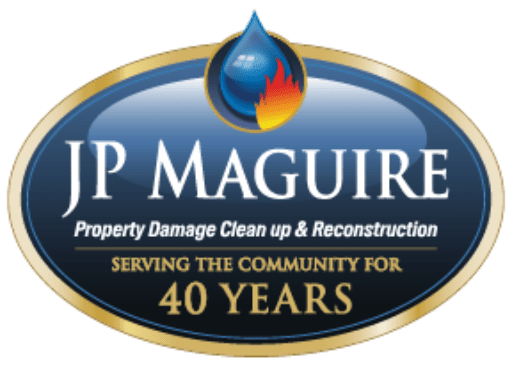Basement flooding is a homeowner’s nightmare, leading to significant property damage, mold growth, and costly repairs. At JP Maguire and Associates, we’ve seen firsthand how devastating water damage can be. Understanding the common causes of basement flooding and taking preventative measures can save you from a lot of headaches down the line. Here’s what you need to know.
1. Heavy Rainfall and Poor Drainage
- Cause: One of the most common reasons for basement flooding is heavy rainfall, especially if your property has poor drainage. When the ground becomes saturated, water can seep through cracks in the foundation or overflow gutters and downspouts, directing water towards your home.
- Prevention: Ensure your gutters and downspouts are clean and free of debris. Downspouts should direct water at least 5-10 feet away from your home’s foundation. Consider installing a French drain or a sump pump to help manage excess water.
2. Foundation Cracks
- Cause: Over time, foundations can develop cracks due to soil movement, settling, or the natural wear and tear of your home. Water can easily find its way into your basement through these cracks.
- Prevention: Regularly inspect your foundation for cracks and have them sealed as soon as they are detected. Waterproofing your basement walls and foundation can also provide an extra layer of protection.
3. Poorly Installed or Failed Sump Pump
- Cause: A sump pump is your basement’s first line of defense against flooding. However, if it’s improperly installed, has a faulty switch, or fails due to a power outage, your basement is at risk.
- Prevention: Test your sump pump regularly, especially before the rainy season. Consider installing a backup battery system to keep it running during power outages. If your sump pump is old or unreliable, it may be time for an upgrade.
4. Sewer Backups
- Cause: A blockage in the sewer line can cause wastewater to back up into your home’s basement, leading to a messy and hazardous situation.
- Prevention: Install a backwater valve to prevent sewage from backing up into your basement. Regular maintenance and inspection of your sewer lines can also help identify potential problems before they lead to a flood.
5. Improper Grading
- Cause: If the land around your home isn’t properly graded, water may flow towards your foundation instead of away from it, increasing the risk of flooding.
- Prevention: Ensure your yard slopes away from your home’s foundation. If you notice water pooling near your home after a rainstorm, consider regrading your yard or adding landscaping features to divert water away.
6. Clogged or Broken Gutters and Downspouts
- Cause: Gutters and downspouts are designed to direct water away from your home. However, if they are clogged with leaves, debris, or are broken, they can overflow and lead to water pooling around your foundation.
- Prevention: Clean your gutters regularly, especially in the fall when leaves are abundant. Ensure that downspouts are free of obstructions and are properly directing water away from your home.
7. Hydrostatic Pressure
- Cause: When the ground around your home becomes saturated with water, it exerts pressure on your foundation walls, known as hydrostatic pressure. This pressure can cause water to seep through even the smallest cracks in your basement walls or floor.
- Prevention: Waterproofing your basement can help to manage hydrostatic pressure. Installing an interior drainage system, such as a French drain, can also relieve pressure by channeling water away from your foundation.
Preventing basement flooding requires vigilance and proactive measures, but it’s well worth the effort. By understanding the common causes of flooding and implementing the right preventative strategies, you can protect your home from significant damage.
If you’re concerned about basement flooding or have already experienced water damage, JP Maguire and Associates are here to help. Our team of experts can assess your home’s vulnerabilities and provide effective solutions to keep your basement dry and safe. Contact us today for a consultation or to learn more about our water damage restoration services. We are available for 24/7 Emergency Service at 877-576-2484.
